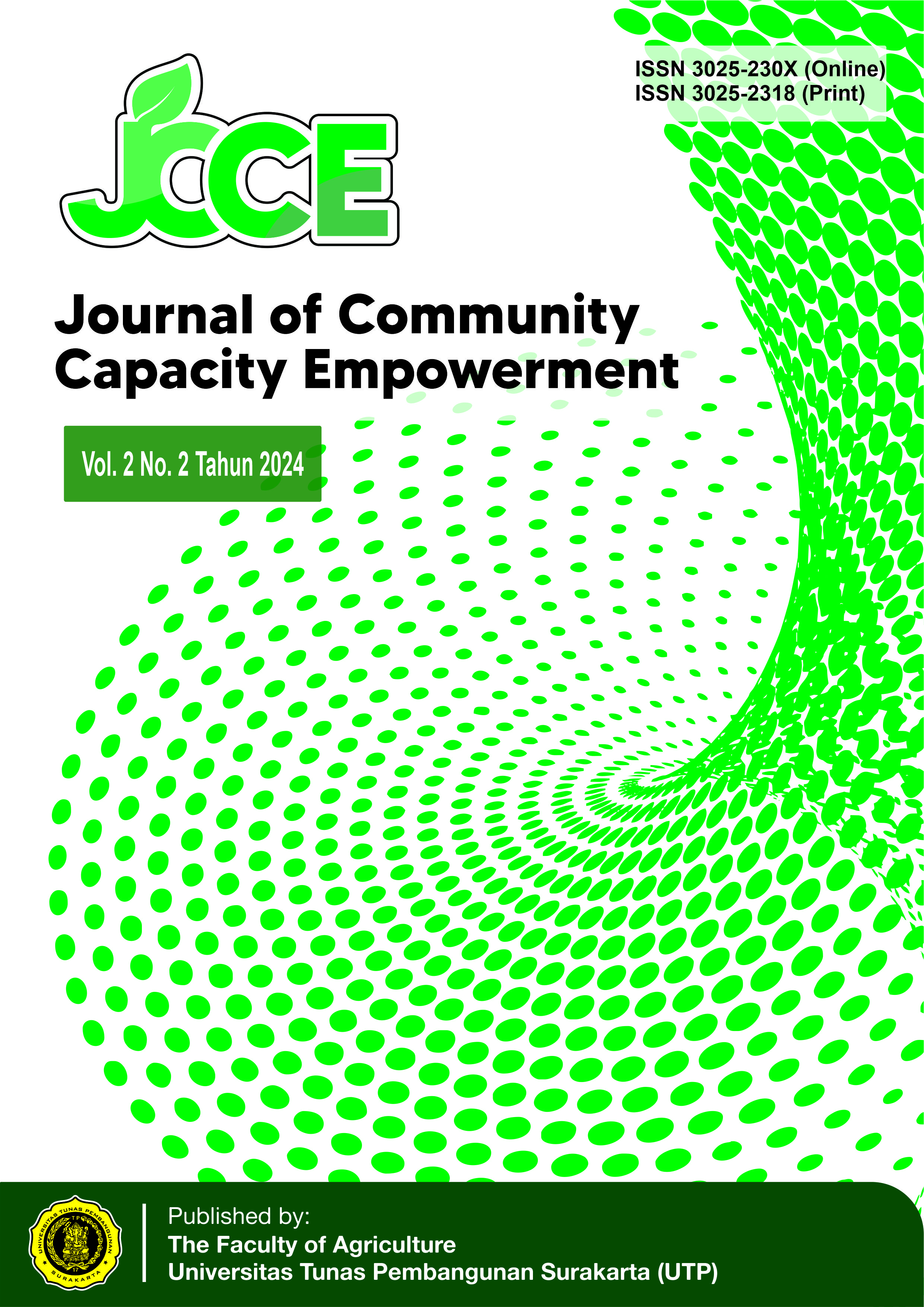Assistance Innovation In Organic Waste Management As A Hydroponic Media Substrate Building A Green Future
Abstract
Organic waste management is becoming increasingly important in responding to current global environmental challenges. In this context, this community service aims to explore the potential for using organic waste as a substrate for hydroponic media in building a greener agricultural future in a sustainable system. The use of organic waste as a substrate for hydroponic media has great potential in supporting plant growth, because it contains available N, P2O5, K2O and C-organic nutrients which are sufficient for plant growth and development. Plants grown in organic waste-based substrates show comparable or even better growth compared to plants grown in conventional substrates. The use of organic waste in hydroponic farming also has a positive impact on the environment. More effective management of organic waste helps reduce environmental pollution and greenhouse gas emissions. This community service program has also succeeded in increasing public awareness and knowledge about organic waste management and hydroponic technology. Thus, the use of organic waste as a substrate for hydroponic media offers great potential in improving organic waste management, increasing agricultural productivity, and reducing negative impacts on the environment. This activity makes a real contribution to building a more sustainable agricultural future and contributes to global efforts in facing increasingly complex environmental challenges.
References
Elsallam, M. E. A., EL-Moslamy, S. H., El-Al, A. A., & Zahran, H. F. (2021). Scaling-up production of cost-effective and eco-friendly bio-fertilizer and its application on Barley green fodder via IoT hydroponic system. Journal of Genetic Engineering and Biotechnology, 19(1), 1–12. https://doi.org/10.1186/s43141-021-00196-1
KHAN, F. A. (2018). A review on hydroponic greenhouse cultivation for sustainable agriculture. International Journal of Agriculture Environment and Food Sciences, 2(2), 59–66. https://doi.org/10.31015/jaefs.18010
Kumari, S., Pradhan, P., Yadav, R., & Kumar, S. (2018). Hydroponic techniques: A soilless cultivation in agriculture. ~ 1886 ~ Journal of Pharmacognosy and Phytochemistry, 1, 1886–1891.
Newell, R., Newman, L., Dickson, M., Vanderkooi, B., Fernback, T., & White, C. (2021). Hydroponic fodder and greenhouse gas emissions: a potential avenue for climate mitigation strategy and policy development. Facets, 6(1), 334–357. https://doi.org/10.1139/FACETS-2020-0066
Patil, S. T., Kadam, U. S., Mane, M. S., Mahale, D. M., & Dhekale, J. S. (2020). Hydroponic Growth Media (Substrate): A Review. International Research Journal of Pure and Applied Chemistry, 21(23), 106–113. https://doi.org/10.9734/irjpac/2020/v21i2330307
Priyadi, S., Fatchul Aziez, A., & Haryuni. (2024). Addition To Green-Based Feed Preparations With Fermentation Technology Innovation Good Ruminant Feeding Practices. Journal of Community Capacity Empowerment, 2(1), 28–33. https://doi.org/10.36728/jcce.v2i1.3113
Priyadi, S. P., Soelistijono, R., Aziez, A. F., & Haryuni, H. (2023). Penjaminan Mutu Pengelolaan Sampah Organik Di Tps Singopuran Yang Berorientasi Pada Good Garbage Practices. GANESHA: Jurnal Pengabdian Masyarakat, 3(2), 155–160. https://doi.org/10.36728/ganesha.v3i2.2609
Priyadi, S. P., Soelistijono, R., Fatchcul Aziez, A., Haryuni, H., & Wiyono, W. (2023). Inovasi Pengelolaan Sampah Rumah Tangga Dengan Teknologi Zero Waste Berorientasi Pada Good Management-Garbage Practices. GANESHA: Jurnal Pengabdian Masyarakat, 3(1), 23–30. https://doi.org/10.36728/ganesha.v3i1.2247
Vinci, G., & Rapa, M. (2019). Hydroponic cultivation: life cycle assessment of substrate choice. British Food Journal, 121(8), 1801–1812. https://doi.org/10.1108/BFJ-02-2019-0112


